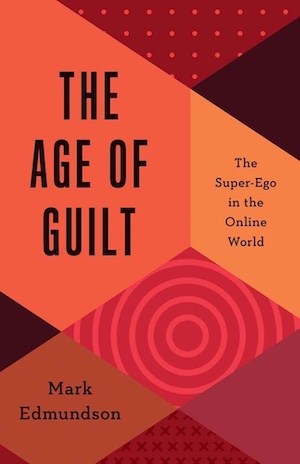By Indira Ganesan
Shortlisted for ΦBK’s 2024 Christian Gauss Award
Is the rage expressed on the internet these days due to the self-judgmental and hyperactive super-ego? This is the question Mark Edmundson poses in The Age of Guilt, a short volume of inquiry into the abundance of hate language and rhetoric on the web. In 28 chapters of just a few pages each (29 if we include his “Biographical Essay” at the end), Edmundson examines both the reasons why the internet has become, as he says, “a site of ridicule, condemnation, and character destruction” and what solutions might exist to counter this tendency. It is the super-ego that causes our destructive behavior, a sense of morality gone wrong that acts like “a tantrum-prone baby with the values of a tin-pot dictator. When it starts screaming for what it wants—Revenge! Retribution!—one might tell it to calm down and get some sleep.” Of course, anyone who has ever faced a crying baby knows that is easier said than done. A super-ego cannot simply be fed and burped and put to bed—it constantly seeks more engagement. What more perfect vehicle for its appetite than the open-24/7 internet?
Edmundson examines the effect the super-ego has on his students, who are overtired and unsatisfied, hard at work, for instance, posting life as it should be on social media. Psychotherapist Adam Phillips, Edmundson points out, said, “We no longer know what the good life might be, so instead we try to create an enviable life.” This leads to inauthenticity, of course, a falsity that eats at our psyches. Edmundson was a student of Harold Bloom, and he also cites Emerson as a kind of spiritual father in his philosophical and psychological inquiries. He suggests that the super-ego responds in self-righteousness, quick to condemn, say, acts of racism, as a performative act. “One must look right, tweet right, post right, succeed in the right way,” he explains, at the cost of the authentic self, which is full of pain and doubt, as well as confusion.
Edmundson turns to W.H. Auden, who suggested that happiness comes in absorption. “Happiness,” continues Edmundson, “is losing yourself in something you love and that will in all probability come to benefit others. Happiness is working in an honorable vocation. Happiness is helping others, protecting others, or enhancing the stock of human knowledge.” Yet there is still the super-ego to contend with, the super-ego that is not only critical of others but of oneself. Edmundson offers some solutions in cleverly named chapters, which are self-explanatory: “Crack a Joke”; “Get Lucky”; “Get Drunk”; “Get Religion”; “Take a Pill”; “Get a Shrink.”
Towards the end of the book, Edmundson talks about the teachings of Jesus, but he also presents us with the tragic figure of Hector—a hero who did not want to fight but knew he had to become a warrior. To me, this was the most interesting part of the book, because of all the characters in The Iliad, it is Hector who to me is the most humane and loving. Edmundson suggests that it is the heroic sacrifice of Hector who knows he must act as soldier in an inevitable and losing war that we might strive to emulate. Yet, I wonder if that is enough of an answer. Homer’s world was controlled by the back-dealings of the gods who had their own agendas. I found myself instead thinking of Rilke, of his book Letters to a Young Poet. I find myself wanting to read Rilke and suggest you might, too.
Novelist Indira Ganesan was inducted into Phi Beta Kappa at Vassar College. Her books include The Journey (Alfred A. Knopf, 1990), Inheritance (Alfred A. Knopf, 1998), and As Sweet As Honey (Alfred A. Knopf, 2013).




